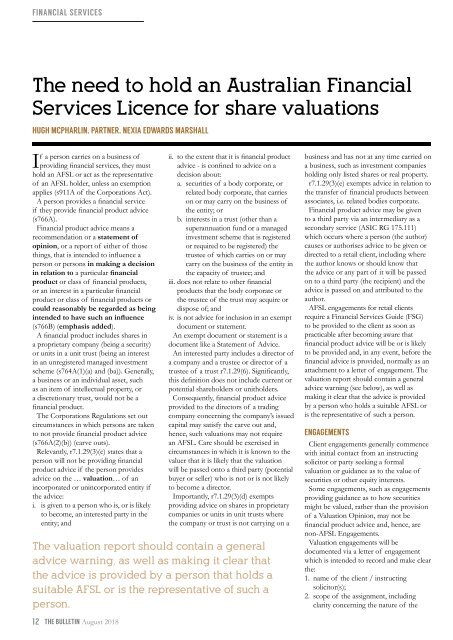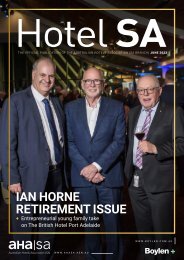The Bulletin August 2018
You also want an ePaper? Increase the reach of your titles
YUMPU automatically turns print PDFs into web optimized ePapers that Google loves.
FINANCIAL SERVICES<br />
<strong>The</strong> need to hold an Australian Financial<br />
Services Licence for share valuations<br />
HUGH MCPHARLIN, PARTNER, NEXIA EDWARDS MARSHALL<br />
If a person carries on a business of<br />
providing financial services, they must<br />
hold an AFSL or act as the representative<br />
of an AFSL holder, unless an exemption<br />
applies (s911A of the Corporations Act).<br />
A person provides a financial service<br />
if they provide financial product advice<br />
(s766A).<br />
Financial product advice means a<br />
recommendation or a statement of<br />
opinion, or a report of either of those<br />
things, that is intended to influence a<br />
person or persons in making a decision<br />
in relation to a particular financial<br />
product or class of financial products,<br />
or an interest in a particular financial<br />
product or class of financial products or<br />
could reasonably be regarded as being<br />
intended to have such an influence<br />
(s766B) (emphasis added).<br />
A financial product includes shares in<br />
a proprietary company (being a security)<br />
or units in a unit trust (being an interest<br />
in an unregistered managed investment<br />
scheme (s764A(1)(a) and (ba)). Generally,<br />
a business or an individual asset, such<br />
as an item of intellectual property, or<br />
a discretionary trust, would not be a<br />
financial product.<br />
<strong>The</strong> Corporations Regulations set out<br />
circumstances in which persons are taken<br />
to not provide financial product advice<br />
(s766A(2)(b)) (carve outs).<br />
Relevantly, r7.1.29(3)(c) states that a<br />
person will not be providing financial<br />
product advice if the person provides<br />
advice on the … valuation… of an<br />
incorporated or unincorporated entity if<br />
the advice:<br />
i. is given to a person who is, or is likely<br />
to become, an interested party in the<br />
entity; and<br />
12<br />
THE BULLETIN <strong>August</strong> <strong>2018</strong><br />
ii. to the extent that it is financial product<br />
advice - is confined to advice on a<br />
decision about:<br />
a. securities of a body corporate, or<br />
related body corporate, that carries<br />
on or may carry on the business of<br />
the entity; or<br />
b. interests in a trust (other than a<br />
superannuation fund or a managed<br />
investment scheme that is registered<br />
or required to be registered) the<br />
trustee of which carries on or may<br />
carry on the business of the entity in<br />
the capacity of trustee; and<br />
iii. does not relate to other financial<br />
products that the body corporate or<br />
the trustee of the trust may acquire or<br />
dispose of; and<br />
iv. is not advice for inclusion in an exempt<br />
document or statement.<br />
An exempt document or statement is a<br />
document like a Statement of Advice.<br />
An interested party includes a director of<br />
a company and a trustee or director of a<br />
trustee of a trust r7.1.29(6). Significantly,<br />
this definition does not include current or<br />
potential shareholders or unitholders.<br />
Consequently, financial product advice<br />
provided to the directors of a trading<br />
company concerning the company’s issued<br />
capital may satisfy the carve out and,<br />
hence, such valuations may not require<br />
an AFSL. Care should be exercised in<br />
circumstances in which it is known to the<br />
valuer that it is likely that the valuation<br />
will be passed onto a third party (potential<br />
buyer or seller) who is not or is not likely<br />
to become a director.<br />
Importantly, r7.1.29(3)(d) exempts<br />
providing advice on shares in proprietary<br />
companies or units in unit trusts where<br />
the company or trust is not carrying on a<br />
<strong>The</strong> valuation report should contain a general<br />
advice warning, as well as making it clear that<br />
the advice is provided by a person that holds a<br />
suitable AFSL or is the representative of such a<br />
person.<br />
business and has not at any time carried on<br />
a business, such as investment companies<br />
holding only listed shares or real property.<br />
r7.1.29(3)(e) exempts advice in relation to<br />
the transfer of financial products between<br />
associates, i.e. related bodies corporate.<br />
Financial product advice may be given<br />
to a third party via an intermediary as a<br />
secondary service (ASIC RG 175.111)<br />
which occurs where a person (the author)<br />
causes or authorises advice to be given or<br />
directed to a retail client, including where<br />
the author knows or should know that<br />
the advice or any part of it will be passed<br />
on to a third party (the recipient) and the<br />
advice is passed on and attributed to the<br />
author.<br />
AFSL engagements for retail clients<br />
require a Financial Services Guide (FSG)<br />
to be provided to the client as soon as<br />
practicable after becoming aware that<br />
financial product advice will be or is likely<br />
to be provided and, in any event, before the<br />
financial advice is provided, normally as an<br />
attachment to a letter of engagement. <strong>The</strong><br />
valuation report should contain a general<br />
advice warning (see below), as well as<br />
making it clear that the advice is provided<br />
by a person who holds a suitable AFSL or<br />
is the representative of such a person.<br />
ENGAGEMENTS<br />
Client engagements generally commence<br />
with initial contact from an instructing<br />
solicitor or party seeking a formal<br />
valuation or guidance as to the value of<br />
securities or other equity interests.<br />
Some engagements, such as engagements<br />
providing guidance as to how securities<br />
might be valued, rather than the provision<br />
of a Valuation Opinion, may not be<br />
financial product advice and, hence, are<br />
non-AFSL Engagements.<br />
Valuation engagements will be<br />
documented via a letter of engagement<br />
which is intended to record and make clear<br />
the:<br />
1. name of the client / instructing<br />
solicitor(s);<br />
2. scope of the assignment, including<br />
clarity concerning the nature of the


















